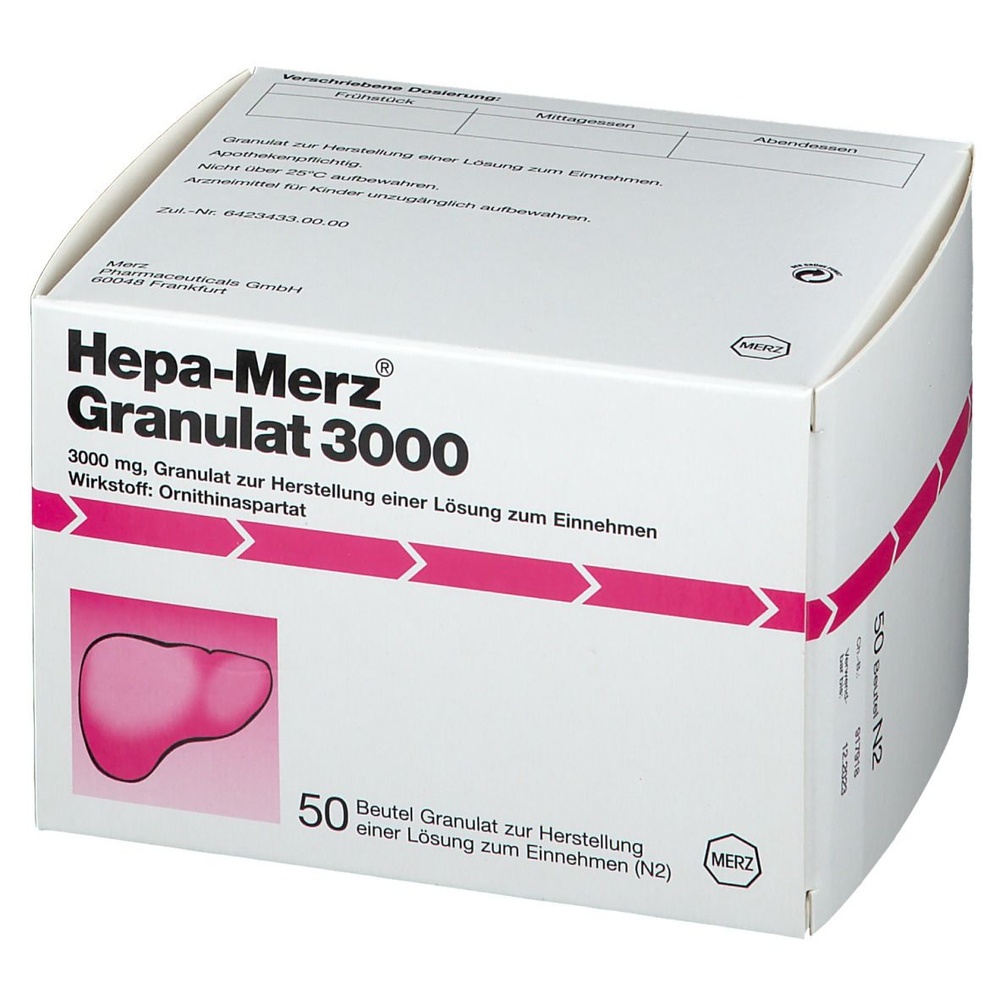

Hepa-mezh 3000

Ask a doctor about a prescription for Hepa-mezh 3000

How to use Hepa-mezh 3000
LEAFLET INCLUDED IN THE PACKAGING: INFORMATION FOR THE PATIENT
Warning! Keep the leaflet, the information on the immediate packaging is in a foreign language!
Hepa-Merz 3000(Hepa-Merz 3g Granules)
3 g/5 g, granules for oral solution
Ornithine aspartate
Hepa-Merz 3000 and Hepa-Merz 3g Granules are different trade names for the same medicine.
You should carefully read the contents of the leaflet before using the medicine, as it contains important information for the patient.
- You should keep this leaflet, so that you can read it again if you need to.
- If you have any further questions, you should ask your doctor or pharmacist.
- This medicine has been prescribed for a specific person. Do not pass it on to others. The medicine may harm another person, even if their symptoms are the same.
- If the patient experiences any side effects, including any side effects not listed in this leaflet, they should tell their doctor or pharmacist. See section 4.
Table of contents of the leaflet:
- 1. What is Hepa-Merz 3000 and what is it used for
- 2. Important information before using Hepa-Merz 3000
- 3. How to use Hepa-Merz 3000
- 4. Possible side effects
- 5. How to store Hepa-Merz 3000
- 6. Contents of the packaging and other information
1. What is Hepa-Merz 3000 and what is it used for
Hepa-Merz 3000 is used to treat latent and overt hepatic encephalopathy occurring in the course of chronic liver diseases, such as chronic hepatitis, liver cirrhosis.
2. Important information before using Hepa-Merz 3000
When not to use Hepa-Merz 3000
Do not use Hepa-Merz 3000 in patients with the following disorders:
- hypersensitivity to L-ornithine L-aspartate, orange yellow S (E 110) or any of the other ingredients of the medicine;
- severe renal impairment (serum creatinine concentration above 3 mg/100 ml);
- disorders of amino acid metabolism involved in the urea cycle, e.g. due to enzymatic defects;
- fructose intolerance.
Warnings and precautions
Hepa-Merz 3000 contains a dye - orange yellow S (E 110), which may cause allergic reactions (including asthma symptoms). This type of allergy is particularly common in people allergic to acetylsalicylic acid.
Hepa-Merz 3000 contains fructose (1.13 g in one sachet, which corresponds to 0.11 bread units). This should be taken into account in patients with diabetes.
Long-term use of Hepa-Merz 3000 may cause tooth decay.
Children:
There are no data on the use of the medicine in children.
Before administering the medicine to infants or children, it is necessary to consult a doctor, as there is a possibility of undiagnosed fructose intolerance in the child.
Hepa-Merz 3000 and other medicines
Tell your doctor about all medicines you are currently taking or have recently taken, as well as any medicines you plan to take.
No interactions between Hepa-Merz 3000 and other medicines are known.
Pregnancy and breastfeeding
If you are pregnant or breastfeeding, think you may be pregnant or plan to have a child, consult your doctor before using this medicine.
Pregnancy:
There are insufficient studies on the safety of using Hepa-Merz 3000 during pregnancy, so the medicine should be avoided during pregnancy. Hepa-Merz 3000 may be taken by pregnant women only if recommended by a doctor.
Breastfeeding:
It is not known whether L-ornithine L-aspartate (the active substance of Hepa-Merz 3000) passes into breast milk. The medicine should be avoided during breastfeeding. Hepa-Merz 3000 may be taken by breastfeeding women only if recommended by a doctor.
Driving and using machines
The ability to drive vehicles and operate machines may be impaired due to the disease being treated with Hepa-Merz 3000.
Hepa-Merz 3000 contains orange yellow S (E 110) and fructose.
See the "Warnings and precautions" section.
3. How to use Hepa-Merz 3000
This medicine should always be used as directed by your doctor. If you are unsure, consult your doctor or pharmacist.
The usual dose of the medicine is 1 or 2 sachets 1 to 3 times a day. The contents of the sachet should be dissolved in a glass of water. Take during or after a meal.
If you feel that the effect of the medicine is too strong or too weak, you should contact your doctor or pharmacist.
Method of administration
Oral administration.
Using a higher dose of Hepa-Merz 3000 than recommended
No symptoms of overdose have been observed with Hepa-Merz 3000 so far. In case of overdose, symptomatic treatment is used.
Missing a dose of Hepa-Merz 3000
You should take the next dose of the medicine at the right time, according to the dosing instructions. Do not take a double dose to make up for a missed dose. If you have any doubts about using the medicine, consult your doctor or pharmacist.
4. Possible side effects
Like all medicines, this medicine can cause side effects, although not everybody gets them.
Uncommon side effects (less than 1 in 100 people):nausea;
vomiting; stomach pain; bloating; diarrhea.
Rare side effects (less than 1 in 10,000 people):
limb pain.
The listed side effects are usually temporary and do not require discontinuation of the medicine.
The excipient - orange yellow S (E 110) may cause allergic reactions.
Reporting side effects
If you experience any side effects, including any side effects not listed in this leaflet, you should tell your doctor or pharmacist. Side effects can be reported directly to the Department of Monitoring of Adverse Reactions to Medicinal Products of the Office for Registration of Medicinal Products, Medical Devices and Biocidal Products,
Aleje Jerozolimskie 181 C, 02-222 Warsaw, Tel.: + 48 22 49 21 301, Fax: + 48 22 49 21 309,
Website: https://smz.ezdrowie.gov.pl.
Reporting side effects will allow more information to be collected on the safety of the medicine.
5. How to store Hepa-Merz 3000
Store out of sight and reach of children.
Do not use the medicine after the expiry date stated on the carton. The expiry date refers to the last day of the given month.
Do not store above 25°C.
Medicines should not be disposed of via wastewater or household waste. Ask your pharmacist how to dispose of medicines that are no longer needed. This will help protect the environment.
6. Contents of the packaging and other information
What Hepa-Merz 3000 contains
The active substance of the medicine is L-ornithine L-aspartate.
1 sachet (5 g granules) contains 3 g L-ornithine L-aspartate.
Excipients: citric acid, citric flavor and aroma, orange flavor and aroma, sodium saccharin, sodium cyclamate, orange yellow S (E 110), povidon K 25, fructose.
What Hepa-Merz 3000 looks like and what the packaging contains
Hepa-Merz 3000 is an orange granule.
The packaging contains 10 or 30 sachets of 5 g.
To obtain more detailed information, you should contact the marketing authorization holder or the parallel importer.
Marketing authorization holder in Austria, the country of export:
Merz Pharma Austria GmbH
Guglgasse 17
1110 Vienna
Austria
Manufacturer:
Merz Pharma GmbH & Co. KGaA
Eckenheimer Landstraße 100
D-60318 Frankfurt
Germany
Parallel importer:
Medezin Sp. z o.o.
Zbąszyńska 3 Street
91-342 Łódź
Repackaged by:
Medezin Sp. z o.o.
Zbąszyńska 3 Street
91-342 Łódź
CEFEA Sp. z o.o. Sp. komandytowa
Działkowa 56 Street
02-234 Warsaw
Pharma Innovations Sp. z o.o.
Jagiellońska 76 Street
03-301 Warsaw
Synoptis Industrial Sp. z o.o.
Szosa Bydgoska 58
87-100 Toruń
CANPOLAND JOINT-STOCK COMPANY
Beskidzka 190 Street
91-610 Łódź
Marketing authorization number in Austria, the country of export: 1-20706
Parallel import authorization number: 18/22 Date of approval of the leaflet: 05.01.2022
[Information about the trademark]
- Country of registration
- Prescription requiredYes
- Marketing authorisation holder (MAH)Merz Pharma Austria GmbH
- This information is for reference only and does not constitute medical advice. Always consult a licensed doctor before taking any medication. Oladoctor is not responsible for medical decisions based on this content.
- Alternatives to Hepa-mezh 3000Dosage form: Granulate, 3 g/5 gActive substance: ornithine oxogluratePrescription requiredDosage form: Granulate, 3 g/5 gActive substance: ornithine oxogluratePrescription requiredDosage form: Granulate, 3 g/5 gActive substance: ornithine oxogluratePrescription required
Alternatives to Hepa-mezh 3000 in other countries
The best alternatives with the same active ingredient and therapeutic effect.
Alternative to Hepa-mezh 3000 in Spain
Alternative to Hepa-mezh 3000 in Ukraine
Online doctors for Hepa-mezh 3000
Discuss dosage, side effects, interactions, contraindications, and prescription renewal for Hepa-mezh 3000 – subject to medical assessment and local rules.














